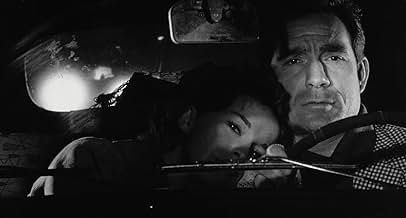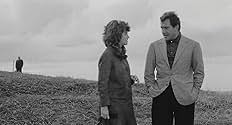अपनी भाषा में प्लॉट जोड़ेंFour short films by four different directors dealing with the principles of modern life.Four short films by four different directors dealing with the principles of modern life.Four short films by four different directors dealing with the principles of modern life.
- पुरस्कार
- कुल 1 जीत
- Husband (segment "Il nuovo mondo")
- (as Jean Marc Bory)
- The son (segment "Il pollo ruspante")
- (as Riky Tognazzi)
- Stripteaser (segment "La ricotta")
- (बिना क्रेडिट के)
- Operaio nella filmazione (segment "La ricotta")
- (बिना क्रेडिट के)
- Woman at Banquet (segment "La ricotta")
- (बिना क्रेडिट के)
- Productor's Wife (segment "La ricotta")
- (बिना क्रेडिट के)
फ़ीचर्ड समीक्षाएं
This is a movie about making a movie. Pasolini's film-within-a-film is about the death of Jesus. Orson Welles portrays the director of this movie. I read that we're supposed to understand that his career has declined to the point where he can only make low-budget movies in Italy. (That's reasonable enough, although I don't understand how we would know that.)
In Welles' movie, we learn that, with the exception of a few stars, who play Mary and Mary Magdalene, the rest of the cast are supposed to be local people from the surrounding poor community. (Some of them may actually be those local people, but one of the angels is played by Ettore Garofolo, who co-starred with Anna Magnani in "Mama Rosa.")
Mario Cipriani stars as Stracci, the character who portrays the Good Thief. There is a running joke throughout the movie about Stracci somehow missing out on every meal. He ultimately steals a dog and sells it to make money. Then he buys an immense amount of cheese. (That's where the title of "La Ricotta" comes from.)
The movie switches back and forth between color for the movie-within-a-movie, and black and white for the movie itself.
The whole movie has a rough, slapped together quality about it. It's not a great film, although reviewers who have seen all four segments say it's the best one.
We saw this film on the smal screen, because it was a bonus DVD packaged with the Pasolini movie "Mama Rosa." Mama Rosa is worth seeing. If you buy it as part of the Criterion Collection, you will have "La Ricotta." Because it's short, and it's there, I would watch it. I don't think it's worth seeking out otherwise.
The Alitalia flight attendant Ana Maria (Rosanna Schiaffino) is harassed by the middle-aged American executive Joe (Bruce Balaban). A psychiatrist gives an orientation to her fiancé Carlo (Carlo Zappavigna), advising Ana Maria to behave like a slut, since the maniac is attracted by her chastity.
This first segment of "Ro.Go.Pa.G." is very disappointing, especially because of the name of Roberto Rossellini in the direction. This boring tale of obsession is neither funny nor dramatic, and seems to be only an advertisement of Italian air flight company Alitalia. My vote is four.
2) "Il Nuovo Mondo" ("O Novo Mundo" "The New World") Director: Jean-Luc Godard - A Dated Romance
The boy-friend of the gorgeous Alessandra (Alexandra Stewart) is hardly sleeping, so obsessed he is for her. When she confesses that she is also in love with him, he sleeps for two consecutive days. When he wakes-up, he reads in the newspaper that there was an atomic super-explosion over Paris, but the specialists advise that without any effect in the population. However, Alessandra changes her behavior, ex-loving him, and he feels that a new world without logic and freedom may be arising.
This second segment of "Ro.Go.Pa.G." is also very disappointing and absolutely dated in the theme and behavior, with every character smoking cigarettes all the time. It is a clear criticism to the menace of an atomic explosion in times of Cold War, and the absolutism of a world without freedom. The narrative in off makes the viewer expect some intriguing conclusion, but in the end it is completely failed and boring. My vote is four.
3) "La ricotta" ("A Ricota") Director: Pier Paolo Pasolini - An Acid View of the Catholicism and the Dominant Classes
While shooting "The Passion of Christ" in the periphery of Rome, the arrogant director (Orson Welles), actors, actresses and cast show their lack compassion with the poor and famine Stracci (Mario Cipriani).
This segment is a very acid view of the Catholicism, and a criticism to the bourgeoisie and the behavior of the human beings in general. The character of Stracci symbolizes the poor people in the world, and how despised they are by the hypocrite dominant classes and the Catholic Church that prays for them. The use of black and white to represent the reality, and colors the fiction of the cinema world is also great. My vote is seven.
4) "Il Pollo Ruspante" ("Frango Caseiro" "Home Cockerel") Director: Ugo Gregoretti - Powerful Criticism to Consumerism and Capitalism
While traveling to see a field nearby a lake, a family does not resist to the appeal of the consumerism. Meanwhile, a famous professor presents to the dominant classes, procedures to increase the consumerism of ordinary people.
This segment is a very explicit criticism to the exaggerated consumerism in the society. The scene when Togni (Ugo Tognazzi) and his middle class family goes to the restaurant is memorable. My vote is seven.
My global vote is six.
Title (Brazil): "Ro.Go.Pa.G."
Godard's atmospheric episode examines post-nuclear effects on human behavior and is a clear criticism on nuclear policy, Moscow and absolutism (notice the newspaper headlines, and the way Alessandra keeps robotically repeating "Absolutely"). It's also a study on Alexandra Stewart's beauty and on sound editing. But above all it revisits the lovers'-quarrel-in-an-apartment-theme so dear to Godard (cf. "Breathless", "Une Femme est une Femme"), preparing his extraordinary 30min chef-d'oeuvre apartment sequence in "Le Mépris", his next film, and is in some ways a sketch for his later "Alphaville".
Pasolini's "La Ricotta" must rank among his best. It has: a) beautiful color tableaux of the crucifixion, emulating Italian Renaissance painting, especially the Florentines; b) a Fellini-like taste in movement, humor, overlapping dialog and crowd directing; c) contagious Italian pop theme by Carlo Rustichelli; d) Orson Welles's (whose great effort here is to manage reading his cue cards in Italian) self-mocking/realistic character -- a once famous American director who is forced in his decadent years to film low-budget epic films in Italy; e) Pasolini's beautiful, prophetic poem from his Mamma Roma's film journal about artists who are caught in "the borders of the eras"; f) of course, an acid criticism on capitalism and the bourgeoisie; and g) a joyful attempt to humanize (i.e. anti-deify) Jesus and the Gospel, much in the way Rossellini had done with the life of St. Francis of Assisi in 1950's "Francesco Giullare di Dio". Pasolini had to face ferocious Vatican confrontation and lawsuits because of this episode, but he went on to make the revolutionary and much misunderstood "The Gospel According to St. Matthew" in 1964.
Very interesting note: in the Italian language version (which is of course post-dubbed, as is the norm in Italian cinema) when the journalist asks the director (Welles) what he thinks about "the great Italian director Federico Fellini" you can see the Italian actor who plays the journalist clearly articulating "...the great Italian director Pier Paolo Pasolini"!!! It says a lot about Pasolini's fame even then and also about how Pasolini mended his coup de vanité in the dubbing so as to finally use the name of his friend Fellini. Oh, and by the way Welles's answer is: "Egli danza....egli danza!" which means "he dances...he dances!".
Gregoretti's episode "Il Pollo Ruspante" is well written and interesting, and impressively prophetic of the theories of consumerism and capitalism that are valid still today, in our "post-industrialized" world. Some scenes are too literal (like the one actually showing the chickens eating in a restaurant) and the end is a little bit too heavy, but it has pace and good acting.
Overall, Godard and Pasolini definitely make "Rogopag" a worthwhile film. If you're in a hurry you can (sorry to say) just skip Rossellini's episode. My vote for GOPA (Godard+Pasolini): 8/10. My vote for all ROGOPAG: 6/10.
क्या आपको पता है
- ट्रिवियाOrson Welles' voice was dubbed into Italian by another actor.
- गूफ़In the segment "La ricotta," Orson Welles is directing a "re-enactment" of the Crucifixion. It shows Jesus lying on top of a cross, tied down, while 4 men carry Christ and his cross up a hill. According to the Stations of the Cross, Christ carried his own cross.
- भाव
The Journalist (segment "La ricotta"): I hope I'm not disturbing. I'm a journalist. I'd like to get a little interview.
The 'Director' (segment "La ricotta"): No more than 4 questions.
The Journalist (segment "La ricotta"): Thank you. First, what do you mean to express with this new work?
The 'Director' (segment "La ricotta"): My intimate, profound archaic Catholicism.
The Journalist (segment "La ricotta"): Second, what do you think of Italian society?
The 'Director' (segment "La ricotta"): The most illiterate masses, and the most ignorant bourgeoisie in Europe.
The Journalist (segment "La ricotta"): And third, what do you think of death?
The 'Director' (segment "La ricotta"): As a Marxist, I never give it any thought.
The Journalist (segment "La ricotta"): Fourth and last question: What do you think of our great director Federico Fellini?
The 'Director' (segment "La ricotta"): He dances.
- इसके अलावा अन्य वर्जनThe Portuguese subtitled version was shown with episodes in a different order: first Frango no Campo / "Pollo rumpante, Il"; then O Novo Mundo / "Nuovo mondo, Il"; and last "Pureza" / "Illibatezza". Pasolini's episode was totally cut by the scissors of official censorship in the theatrical release.
- साउंडट्रैकRicotta Twist
by Carlo Rustichelli
टॉप पसंद
- How long is Ro.Go.Pa.G.?Alexa द्वारा संचालित
विवरण
- चलने की अवधि2 घंटे 2 मिनट
- रंग
- ध्वनि मिश्रण
- पक्ष अनुपात
- 1.85 : 1
इस पेज में योगदान दें




































